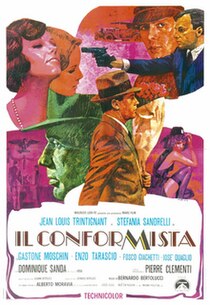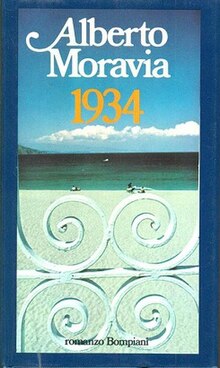
Luigi Pirandello was an Italian dramatist, novelist, poet, and short story writer whose greatest contributions were his plays. He was awarded the 1934 Nobel Prize in Literature for "his almost magical power to turn psychological analysis into good theatre." Pirandello's works include novels, hundreds of short stories, and about 40 plays, some of which are written in Sicilian. Pirandello's tragic farces are often seen as forerunners of the Theatre of the Absurd.

Primo Michele Levi was an Italian Jewish chemist, partisan, Holocaust survivor and writer. He was the author of several books, novels, collections of short stories, essays, and poems. His best-known works include If This Is a Man, his account of the year he spent as a prisoner in the Auschwitz concentration camp in Nazi-occupied Poland; and The Periodic Table (1975), linked to qualities of the elements, which the Royal Institution named the best science book ever written.

The British Union of Fascists (BUF) was a fascist political party in the United Kingdom formed in 1932 by Oswald Mosley. It changed its name to the British Union of Fascists and National Socialists in 1936 and, in 1937, to British Union. It was disbanded in 1940, after it was proscribed by the British government following the start of the Second World War.

Two Women is a 1960 Italian film directed by Vittorio De Sica. It tells the story of a woman trying to protect her young daughter from the horrors of war. The film stars Sophia Loren, Jean-Paul Belmondo, Raf Vallone, Eleonora Brown, Carlo Ninchi, and Andrea Checchi. The film was adapted by De Sica and Cesare Zavattini from the novel of the same name written by Alberto Moravia. The story is fictional, but based on actual events of July 1943 in Rome and rural Lazio, during what Italians call the Marocchinate.

Gaetano Salvemini was an Italian anti-fascist politician, historian and writer. Born in a family of modest means, he became an acclaimed historian both in Italy and abroad, in particular in the United States, after he was forced into exile by Mussolini's Fascist regime.

The Conformist is a novel by Alberto Moravia published in 1951, which details the life and desire for normalcy of a government official during Italy's fascist period. It is also known for the 1970 film adaptation by Bernardo Bertolucci.

Robert Brasillach was a French author and journalist. Brasillach is best known as the editor of Je suis partout, a nationalist newspaper which came to advocate various fascist movements and supported Jacques Doriot. After the liberation of France in 1944 he was executed following a trial and Charles de Gaulle's express refusal to grant him a pardon. Brasillach was executed for advocating collaborationism, denunciation and incitement to murder. The execution remains a subject of some controversy, because Brasillach was executed for "intellectual crimes", rather than military or political actions.

Alberto Moravia was an Italian novelist and journalist. His novels explored matters of modern sexuality, social alienation and existentialism. Moravia is best known for his debut novel Gli indifferenti (1929) and for the anti-fascist novel Il Conformista, the basis for the film The Conformist (1970) directed by Bernardo Bertolucci. Other novels of his adapted for the cinema are Agostino, filmed with the same title by Mauro Bolognini in 1962; Il disprezzo, filmed by Jean-Luc Godard as Le Mépris ; La Noia (Boredom), filmed with that title by Damiano Damiani in 1963 and released in the US as The Empty Canvas in 1964 and La ciociara, filmed by Vittorio De Sica as Two Women (1960). Cédric Kahn's L'Ennui (1998) is another version of La Noia.

Indro Alessandro Raffaello Schizogene MontanelliKnight Grand Cross OMRI was an Italian journalist and historian, considered the best italian journalist of the 20th century.

Timothy Harold Parks is a British novelist, translator, author and professor of literature.

Natalia Ginzburg, was an Italian author whose work explored family relationships, politics during and after the Fascist years and World War II, and philosophy. She wrote novels, short stories and essays, for which she received the Strega Prize and Bagutta Prize. Most of her works were also translated into English and published in the United Kingdom and United States.

Italian Fascism, also known as Classical Fascism or simply Fascism, is the original fascist ideology as developed in Italy by Giovanni Gentile and Benito Mussolini. The ideology is associated with a series of three political parties led by Benito Mussolini, namely the Revolutionary Fascist Party (PFR) founded in 1915, the succeeding National Fascist Party (PNF) which was renamed at the Third Fascist Congress on 7–10 November 1921 and ruled the Kingdom of Italy from 1922 until 1943 and the Republican Fascist Party that ruled the Italian Social Republic from 1943 to 1945. Italian Fascism is also associated with the post-war Italian Social Movement and subsequent Italian neo-fascist movements.
Pitigrilli was the pseudonym of Dino Segre,, an Italian writer who made his living as a journalist and novelist. His most noted novel was Cocaine (1921), published under his pseudonym and placed on the list of prohibited books by the Catholic Church because of his treatment of drug use and sex. It has been translated into several languages and re-issued in several editions. Pitigrilli published novels up until 1974, the year before his death.

The Conformist is a 1970 political drama film directed by Bernardo Bertolucci, whose screenplay is based on the 1951 novel The Conformist by Alberto Moravia. The film stars Jean-Louis Trintignant, Stefania Sandrelli, Gastone Moschin, Enzo Tarascio, Fosco Giachetti, José Quaglio, Dominique Sanda and Pierre Clémenti. The film was a co-production of Italian, French, and West German film companies.

The Woman from Rome is a 1947 novel by Alberto Moravia about the intersecting lives of many characters, chief among them a prostitute and an idealistic intellectual who, after an interrogation by the Fascist officers, during which he betrays his colleagues, becomes completely disillusioned about everything.

Alain Elkann is an Italian novelist, journalist. Currently, Elkann is the conductor of cultural programs on Italian television. He is President of the Scientific Committee of the Italy-USA Foundation. A recurring theme in his books is the history of the Jews in Italy, their centrality to Italian history, and the relation between the Jewish faith and other religions. He is a writer for La Règle du Jeu, Nuovi Argomenti, "A" and Shalom magazines.
Ferenc Körmendi was a Hungarian novelist very popular in the period between the two world wars. After periods of exile, he finally settled in the USA in 1946.

Anti-fascism is opposition to fascist ideologies, groups and individuals. The anti-fascist movement began in a few European countries in the 1920s, and eventually spread to other countries around the world. It was at its most significant shortly before and during World War II, where the fascist Axis powers were opposed by many countries forming the Allies of World War II and dozens of resistance movements worldwide. Anti-fascism has been an element of movements holding many different political positions, including social democratic, nationalist, liberal, conservative, communist, Marxist, trade unionist, anarchist, socialist, pacifist and centrist viewpoints.

Luce d’Eramo was an Italian writer and literary critic. She is best known for her autobiographical novel Deviazione, which recounts her experiences in Germany during World War II. D’Eramo’s writings are characterized by interest toward controversial subjects and a search of solutions that would liberate people from physical and mental constraints.

Vasco Ferretti is an Italian novelist, historian, professor and journalist from Buggiano, Tuscany. He has written books in the fiction genres of historical novels and the Romance novel. His most important books are Kesselring (2009), Vip & Stars (1983), Dante Alighieri e la battaglia di Montecatini (2015), Le stragi naziste sotto la linea gotica 1944: Sant'Anna di Stazzema, Padule di Fucecchio, Marzabotto (2004).


















